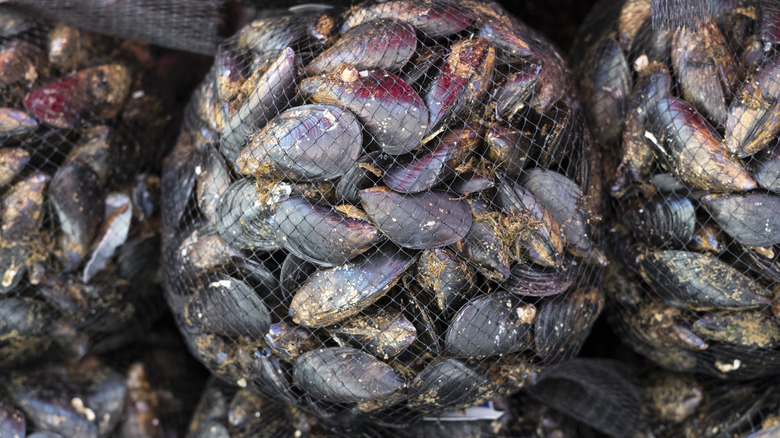The Shellfish Chefs Say You Should Never Buy Frozen
Frozen foods provide a more convenient cooking experience, but you risk sacrificing quality. In fact, there are certain items that professionals consider off-limits in the frozen food section, according to Food & Wine. As explained by executive chef Matt Wynn, buying frozen mussels can result in a lackluster meal thanks to diminished quality. Wynn states, "No one likes a rubbery, bland mussel," which is precisely what can happen when this shellfish is frozen before arriving in your kitchen.
Frozen mussels also have other downsides, such as coloring agents to help the seafood achieve a pink shade synonymous with freshness. Mussels are also beloved for their sea-tinged, subtle flavors, which will practically be absent after the shellfish has been frozen, thawed, and served. While freezing food is effective for keeping it safe and preventing bacterial growth, the practice does cause distinct changes to flavors and textures. And while these changes are particularly noticeable with shellfish, they can impact all types of food.
What freezing does to shellfish and other foods
As explained by the USDA, freezing food slows down enzyme activity that contributes to spoilage. In cold temperatures, bacteria and mold become dormant, which alleviates concerns related to food safety. Proper freezing also greatly reduces the risk of foodborne illness, which can cause significant gastrointestinal issues. Despite the practical benefits of freezing, it can have a less-than-desirable impact on the quality of your food, especially items with a high concentration of water, like mussels.
In this case, freezing contributes to the formation of ice crystals. When food is defrosted, these ice crystals will break down and leave major deficiencies in both the flavor and texture of food and mussels are no exception. Improperly frozen foods can also fall victim to freezer burn, which results from air exposure while an item is in cold storage. These dry spots are typically inedible, so they should be trimmed away before food can be eaten. Meanwhile, the experts at New York City's Fulton Fish Market recommend tossing freezer-burned shellfish rather than risk getting sick.
Purchasing mussels fresh will help you avoid those common quality issues associated with freezing. However, knowing what to look for when shopping for live bivalves is essential.
Tips for choosing the best fresh mussels
Canada's PEI Mussels offers some guidance to help you find the choicest specimens when buying fresh seafood. You can tell a lot about a fishmonger or seafood store by how fresh the selections smell. Fish and other types of seafood should have a fresh, salty aroma, similar to the ocean. Strong "fishy" odors mean that the selections are not fresh and that you should conduct your shopping at another retailer.
Once you get past the sniff test, pay close attention to how mussels are displayed. They should be spread out over a bed of ice and appear moist, which will keep them fresh until they're purchased. Along with receiving frequent spritzes of water, mussels should be turned regularly to ensure they remain uniformly moist. Finally, ask to see the product tag if it's not readily available. The tag will contain information on the harvest date of the mussels, as well as any Best By dates, to help you make the right choice.


